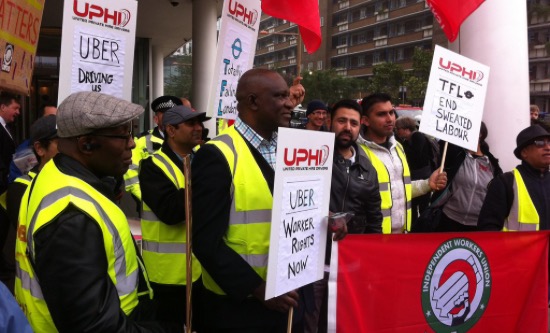
On 19 February the British Supreme Court found that 25 former Uber drivers were legally ‘workers’ in 2016, not ‘self-employed’ as claimed by Uber, meaning they are entitled to the minimum wage. The unanimous judgement also found that the drivers were ‘workers’ not only when transporting riders, but also whenever they were logged into the app and awaiting fares.
As explained by the Fairwork network of academics, ‘Under the UK’s employment classification system, workers are entitled to certain employment rights, including the right to national minimum wage, paid leave, protection against unlawful discrimination, and protection for whistleblowing. The benefits of workers are limited compared to those of employees. For instance, as workers, rideshare drivers will still not be protected from unfair dismissal or deactivation[…]. Nonetheless, this ruling represents a huge step forward in tackling the precarious nature of gig work in the UK.’ In 2019 a University of Hertfordshire study estimated that 4.7m people in Britain worked in the gig economy at least once a week.
Fearing a barrage of expensive compensation claims by its 70,000 current drivers, Uber announced that from 17 March drivers would get a pay rise to ‘reflect your right to paid holiday’ and would be guaranteed the minimum waxge while driving. They also committed to establishing a pension scheme. In effect this is a partial recognition by Uber of its drivers’ ‘worker’ status but falls short, notably by still refusing to pay drivers for their waiting time, which can be as much as half of the time drivers pass logged into the app. Uber has said they will also pay ‘vehicle running costs’ but it is not clear how fair this will be when applied to the large variety of car types, toll fees and so on.
Fairwork academic Srujana Katta noted that, ‘During Covid-19, demand for rides has plummeted, and unpaid waiting time is higher than ever. It’s in Uber’s interest to keep drivers’ waiting time high as that means lower customer waiting times.’
The victory of this legal battle, led by James Farrar and Yaseen Aslam of the App Drivers and Couriers Union (ADCU), is the result of what the ADCU described as ‘many years of painstaking organising, campaigning and strategic litigation’. But the war is not yet won. Uber’s concessions are ‘a day late and a dollar short’, according to Farrar and Aslam. Its executives will still fight to stop the increase in labour costs which would result from full application of the judgement to its current drivers. They also fear a consequent reclassification of the company as a transportation provider liable for VAT on fares, meaning a £2bn retroactive tax bill.
An international struggle
The fight for gig workers’ rights is international. Uber is a multinational monopoly, which operates in 69 countries; a quarter of its revenue before the pandemic came from just five key cities: London, New York, Los Angeles, San Francisco, and Sao Paolo.
At least 39 similar legal battles are underway in at least 20 countries worldwide including the US and much of Western Europe (ILAW, Mar 2021). In California last year, gig companies spent $200m on a successful campaign for a ballot measure to reverse an earlier ruling that gave drivers and couriers in the state ‘employee’ status. The measure gave gig workers a special third status which includes benefits like accident insurance and healthcare contributions but not basic rights like minimum wage and sick pay.
Carers and couriers
Another recent setback in Britain was arguably more far-reaching than the Uber victory. A Supreme Court ruling on 19 March found that a private care provider was not legally obliged to pay its care workers minimum wage for ‘sleep-in’ shifts. The ruling shores up the legalisation of precarious work for the mostly female workforce of the whole care sector. The tribunal heard that care worker Clare Tomlinson-Blake was paid as little as £30 by Mencap for each overnight shift at a care home.
As we go to press the fight against gig employment with courier company Deliveroo is picking up steam. Its planned $2.5bn float on the stock market next month will lead to a $500m payday for its owners, while one in three of its drivers currently earn less than minimum wage according to the Bureau of Investigative Journalism. Several large investors have already been pressured to pull out, and couriers have threatened strike action. RCG supports couriers in the class struggle: see ‘Victory against victimisation of union organiser by Deliveroo’ on our website.
Legal challenges are useful and victories like these are welcome, but they do not tackle the capitalist roots of precarious work. Campaigning must demand the right of all workers to stable waged employment. We cannot wait for a million more employment tribunals to wend their way through the courts. We must organise to fight for a planned economy where labour is performed for public need and access to health care and childcare are universal.
Adam Grey
FIGHT RACISM! FIGHT IMPERIALISM! 281 April /May 2021




